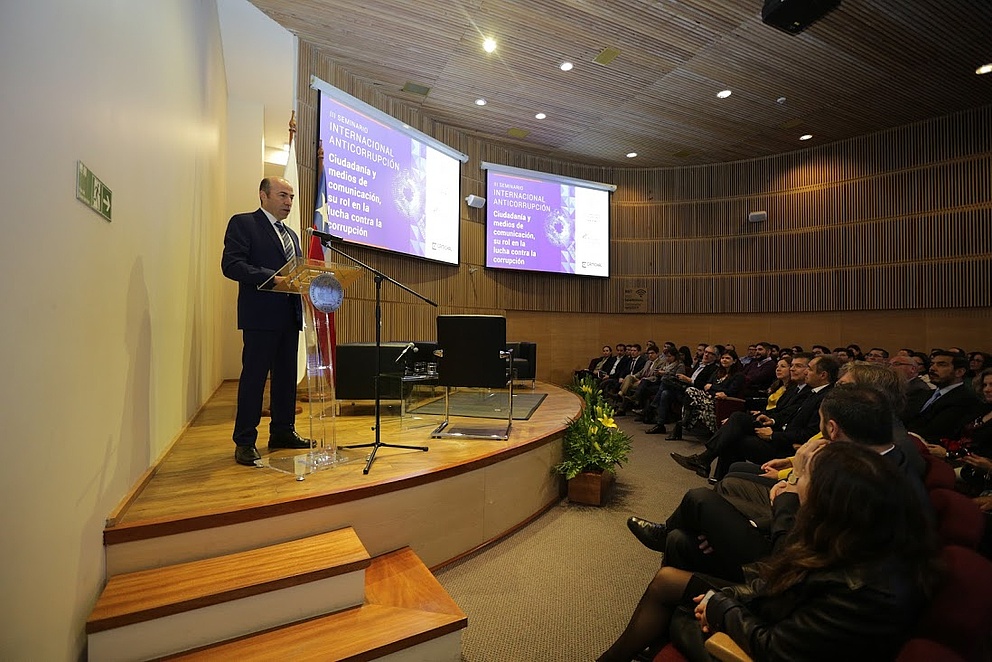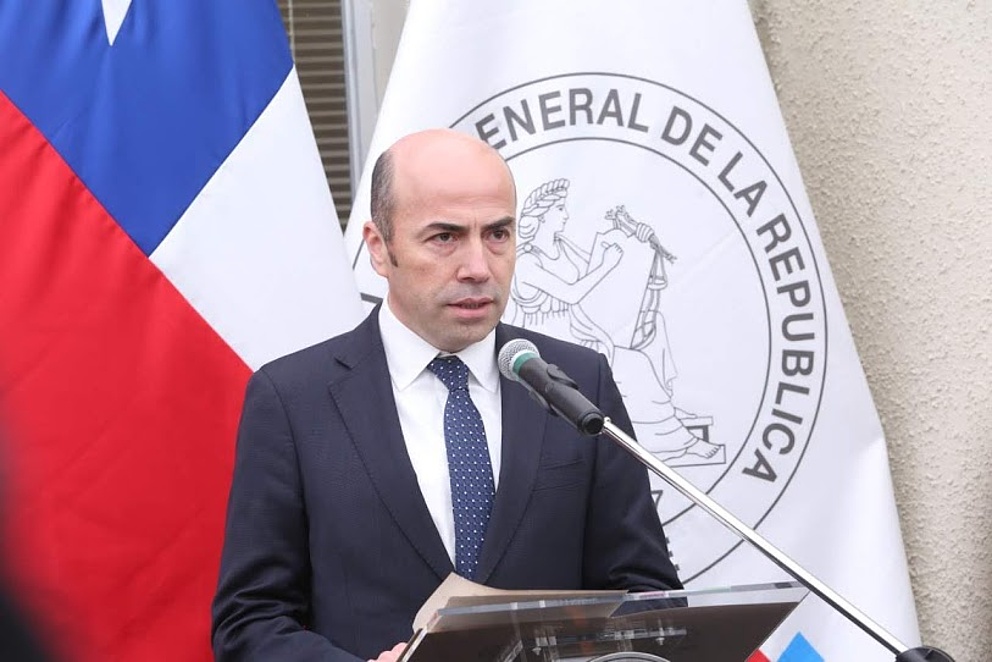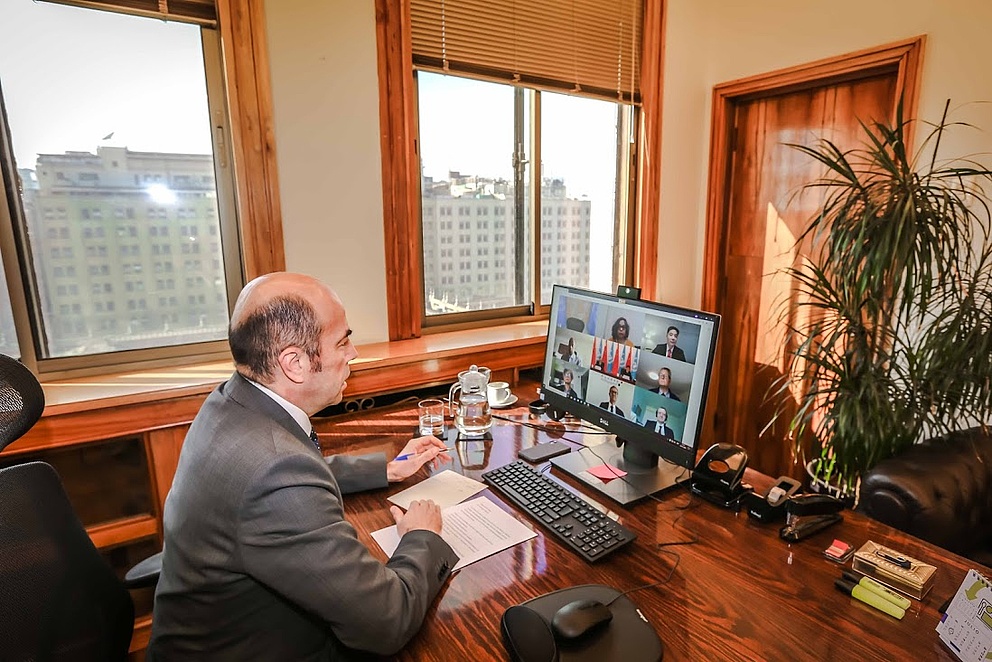
Contact
Press, Communications and Marketing
Tel.: +49 228 833-144
Fax: +49 228 833-441
presse[at]avh.de
Academic, environmental activist, Comptroller General of the Republic of Chile and now also Chairman of the United Nations Board of Auditors – in the career of Humboldt alumnus Jorge Bermúdez Soto, personal development and justice have played an important role. Through his work he wants to do something for society, in the fight against corruption, and to protect democracy in his country which is currently in a historic process of drafting a new constitution. In this interview, he describes how his periods of research in Heidelberg and Giessen influenced his career path and his vision for science and research in Chile.
Humboldt Foundation: Mr Bermúdez Soto, When you look back on your time in Germany what is the first image, smell or special moment to come to mind?
Jórge Bermúdez Soto: The wonderful greenness and refreshing scent of summer rain which we really miss in my part of Chile. I also have a very vivid memory of the study tour the Humboldt Foundation organised around Germany. Together with many other fellows from all over the world we were welcomed at Schloss Bellevue by the then Federal President, Johannes Rau.
You came to university in Giessen and Heidelberg at the beginning of the millennium as a postdoc in environmental law. Why did you choose Germany for your research stay?
I did my doctorate in Madrid and discovered the influence of German public law on Spanish jurisprudence and thus on the development of the law in Latin America. This is particularly true of environmental law where a large percentage of legal bases come from Germany. Then, at the end of the 1990s, I learnt German. This was the time when I met my wife who is German. So, both professionally and personally, it has always been important to me to stay connected with this country.
Is Germany a popular destination for junior researchers in Chile?
In my circles that was the case at the time. German science is very well respected in Chile. Anyone who has studied or done research in Germany has a competitive edge. Nevertheless, nowadays, countries like England, the United States and, more recently, Australia and New Zealand, tend to be more popular.
Why is this?
Perhaps because there isn’t such a language barrier. On principle, I encourage my doctoral students to spend time studying abroad – also in Germany because international mobility is important. Without my experience abroad I would never have got where I am today.
What experiences have particularly shaped you?
My research stays in Heidelberg and Giessen didn’t just advance me professionally; they made me more open and confident. In human terms I benefitted as well. Professor Arndt Schmehl, with whom I have conducted German-Chilean research projects into environmental justice for many years, became one of my best friends. Sadly, he died far too early in 2015.
Being part of the Humboldt Network has played a crucial role in my professional development.
To what extent has the Humboldt Foundation influenced your career?
Being part of the Humboldt Network has played a crucial role in my professional development. Although there are relatively few Humboldtians in Chile, the Foundation is very well-known in academic circles. Also, the new position that I have recently assumed as head of the UN Board of Auditors, which is the external auditor for UN agencies and programmes like UN Women and UNICEF, is linked to Germany and thus indirectly to my time as a Humboldt Fellow.
In what way?
In 2015, at the beginning of my period in office as Comptroller General of the Republic of Chile – a position equivalent to the President of the Federal Audit Office in Germany – I was talking to Kay Scheller, who is the President of Germany’s Federal Audit Office, and we had the idea of applying for the UN Board of Auditors. Today, Chile shares the position with Germany and China.
Back to your roots: You grew up in Valparaíso, read law there and, as well as teaching at the university there, you advised companies, state authorities and international organisations on environmental law. Do you have a personal connection to the topic of the environment, perhaps going back to your childhood or youth?
No, but from about the age of 12, I already knew I wanted to study law. My childhood experiences under Pinochet’s military dictatorship influenced my choice of profession. My parents, both teachers and members of a left-wing party, were not allowed to continue teaching. A very difficult situation. My interest in environmental law developed while I was doing my doctorate.
Which environmental topics are occupying you at present?
Chile is badly hit by climate change. I am just sitting in my office in Santiago. Looking through my window, I can see the Andes. Although it’s winter now, there is hardly any snow. Twenty years ago, it was quite a different story. But apart from climate change, there are also other serious environmental issues that are closely linked with social inequality.
What issues are they?
I am thinking, for instance, of copper mining, the unfair use of land and water as well as coal-fired power stations and refineries which are mostly located in poorer areas. The number of cases of cancer and respiratory diseases is much higher in these areas than in rest of the country. These inequalities were one of the reasons for the unrest that broke out at the end of 2019 and triggered the change in the constitution.
In 2020, there was a referendum in which the Chilean population voted for an historic change of the constitution which is currently being drawn up by a constitutional assembly directly elected by the people. Another referendum will be held in 2022 to vote on it. This process could bring about a change from a neoliberal state policy to a more social one. What is the significance of your work in this context?
As the supreme audit institution, we protect and reinforce democracy by externally and independently controlling the actions of public administration and ensuring that public funds are used properly. In Chile, as everywhere else, there are people who are more interested in their own advantages than in the common good. That’s what we try to prevent.

What have your activities managed to reveal so far?
Typical examples are paying enormous salaries and severance payments to top managers in state-owned companies, employing family members and appointing people to key positions in the administration who have conflicts of interest. Our work is also appreciated by the population who inform us about suspected new cases. This trust is incredibly important to us, particularly now.
Why particularly now?
A crisis in political institutions during which people have no faith in the authorities is an ideal environment for populist politicians to propagate simplifying solutions to complex problems. That would severely endanger democracy. Through our public outreach – we have more than 150,000 followers on Twitter – we constantly engage in communication with civil society.
What are your personal hopes for constitutional change?
The neoliberal model that was introduced under Pinochet at the start of the 1980s is at an end. I am confident that the new constitution will give the country more stability and allow us to have a more optimistic vision of the future. I hope for more equality, that stronger social rights will be guaranteed, for ecological sustainability, the containment of climate change and the recognition of diversity in our society, including the indigenous Mapuche people.
What are your hopes for the future of science and research in Chile?
Chile has to change from a country that is based on plundering natural resources to a country where sustainable innovation is the driving force for progress. To do so, it is essential to promote education, science, research and development. It is time for our researchers not only to go abroad but to return full of enthusiasm and have good opportunities to meaningfully apply their knowledge here. There’s a lot to do!
Author: Esther Sambale
![[Translate to English:] Porträtfoto Bermúdez Soto](/fileadmin/_processed_/5/6/csm_BermudezSoto_vita_aab0221eea.jpg)
Jorge Bermúdez Soto read law at the Pontificia Universidad Católica de Valparaíso in Chile. He took his doctorate in law as well as his Master’s in European Community Law at the Universidad Autónoma de Madrid. In the context of a Humboldt Research Fellowship in Germany, he also completed a postdoctoral degree in environmental law at the Universities of Giessen and Heidelberg at the beginning of the millennium. In 2015, Bermúdez Soto was appointed Comptroller General of the Republic of Chile and heads his country’s supreme audit institution. He was elected Chairman of the UN Board of Auditors, which is the external auditor for UN agencies and programmes like UN Women and UNICEF, in 2021.
Bermúdez Soto is also Executive Secretary of OLACEFS, the organisation of Latin American and Caribbean supreme audit institutions in which he is chairman of the working group on gender equality and non-discrimination as well as the Public Works Audit Working Group.


